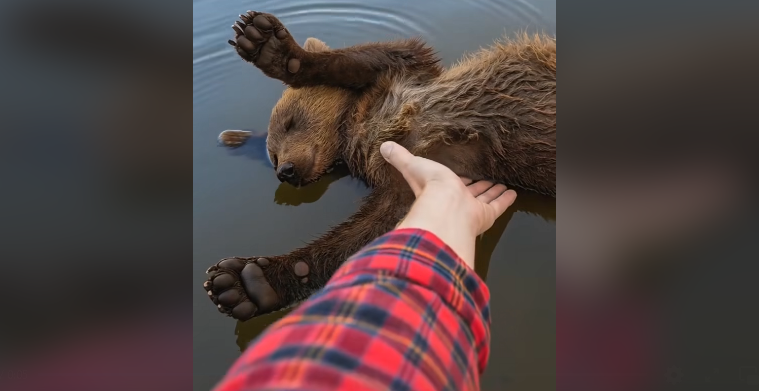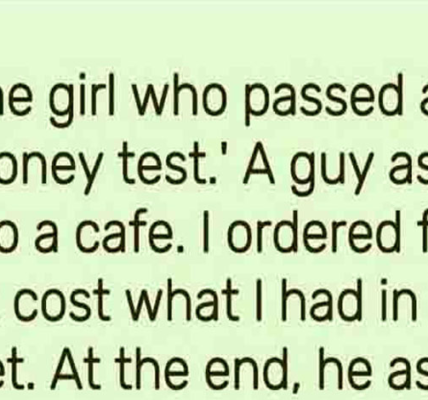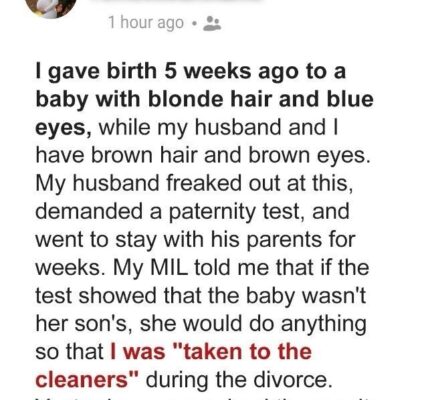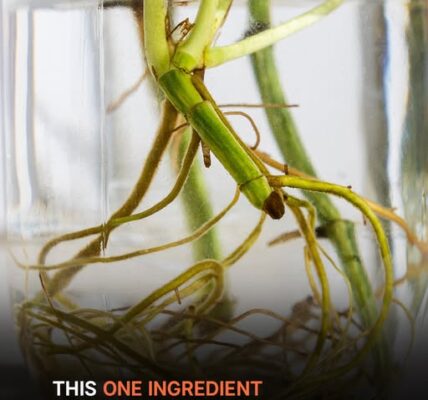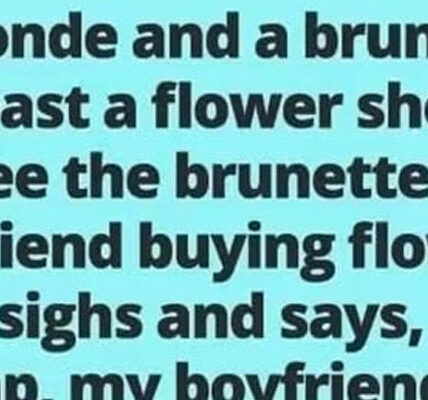My name is Marcus Webb, and for more than fifteen years I’ve lived in the wild more than anywhere else. The Pacific Northwest has been my classroom, my office, and sometimes my therapist. I’ve guided hikers through bear country, photographed storms rolling over ridgelines, and spent more nights under the open sky than in my own bed. I know the rules. I teach the rules. You don’t approach wildlife. You don’t interfere. You definitely don’t get between a mother and her young.
Experience makes you confident. Confidence makes you sloppy. And sometimes, nature gives you a wake-up call you never forget.
It happened late August, during the salmon run. I’d driven deep into the backcountry to photograph the river — fast, cold, thrashing with life. Salmon fighting upstream, eagles circling overhead, the scent of pine and wet earth thick in the air. One of those days where you feel small in the best way.
I was walking along the riverbank with my camera gear when I saw something caught in the current. At first it looked like driftwood — a dark, sodden shape tumbling slowly in the water. But the moment it rotated, I saw limbs. Fur. A tiny body half-submerged, spinning helplessly.
A bear cub.
My first reaction was rational: this happens. Cubs get swept away. Nature’s brutal math doesn’t always add up in their favor. But then instinct — human instinct — shoved its way forward. The kind of impulse that says do something even when logic says don’t. I couldn’t just watch it drown.
So I did what every safety manual warns against. I dropped my pack, stepped into the freezing water, and fought my way toward the cub. The current grabbed at my legs, numbing them instantly. When I reached it, the little body sagged in my arms, heavier than I expected, limp and cold. I pulled it onto the bank, heart hammering.
Then it twitched.
A small shudder, a gasp, the faintest sign of life. Relief hit me fast — I’d saved it. Or so I thought. That moment of pride lasted maybe three seconds.
Because then I heard the sound.
A low, rolling growl came from the trees behind me. Not loud at first, but deep enough to vibrate in my bones. I knew that sound. Every guide knows that sound. But hearing it up close is a different thing entirely.
I turned, slowly, praying I was wrong.
I wasn’t.
A massive black bear stepped out from the brush, shoulders rippling, eyes locked not on me — but on her cub cradled in my arms. The look in her eyes wasn’t rage. It was terror. A mother seeing a threat where I saw a rescue.
I understood in a single flash of clarity: I hadn’t saved her cub. I’d taken it.
She rose onto her hind legs, towering over the riverbank, and let out a roar that punched straight through my chest. Every instinct in me screamed for stillness, but panic had already taken the wheel.
I tossed the cub gently toward the shore and ran.
The moment my feet hit the forest floor, I knew I’d made the wrong decision. You can’t outrun a bear. Not in a sprint. Not on your best day. And definitely not when adrenaline has turned your brain into static.
Branches ripped at my arms as I sprinted blindly through the trees. The sound of her charging behind me — paws slamming the ground like drums — was the kind of terror that scrambles your thoughts. I didn’t make it far.
Impact hit me like being struck by a truck. Her weight slammed me flat, knocking the air from my lungs. Claws tore into my back, fire ripping across my skin. I hit the dirt, rolling to my side, and found myself face-to-face with her.
She towered over me, jaws open, breath hot, eyes burning with pure instinct. Not cruelty. Not malice. Just raw, primal drive: protect the cub at all costs.
I lay still, bracing for the moment everything ended.
But it didn’t.
Instead, she huffed — a sharp, warning sound — then stepped back. Her muscles still trembled with adrenaline, but something in her had shifted. The threat was gone. I was no longer between her and her cub.
She turned away from me.
I watched through blurred vision as she lumbered back to the little body on the bank, nudged it gently, then lifted it in her jaws. A moment later, the cub sputtered, coughed, and stood. Alive. Breathing. Saved — not by me, but by her own fierce protection.
Pain roared through my body as the adrenaline drained. Somehow, I managed to stagger to my truck and call for help. Paramedics got to me in time. The claws had ripped deep, but missed anything vital. I’d live. I’d heal. And I’d carry the scars — physical and mental.
A wildlife officer came to see me the next day. He reviewed the report, asked a few questions, then said something that stuck with me more than anything else.
“You weren’t attacked because she was aggressive. You were attacked because you ignored the rules. When you backed off, she spared you.”
It wasn’t judgement. It was truth. I had acted on emotion, not experience. I assumed I knew better. I assumed rescue made me the hero. Nature corrected that notion quickly.
When I talk to hikers now, or photographers eager for that perfect shot, I tell them exactly this: if you see a bear cub alone, walk away. The mother is close. Always. And she’s watching long before you realize she’s there. You are not the savior in that moment. You are the threat. Back away, and you give her a choice. Push forward, and she won’t hesitate.
That day changed everything about how I move through the wilderness. It reminded me that the wild isn’t a backdrop for our stories — it’s a world with its own rules, its own families, its own protections. I still photograph bears. I still guide hikers. But I do it with a deeper respect for the instincts that keep wild animals alive.
Every year, I return to that river. I’ve never seen the mother again. Maybe she remembers the spot. Maybe the cub grew strong and learned the lessons its mother fought for. I like to think they’re both out there, thriving.
She could have killed me that day. Easily. But she didn’t.
She gave me a warning, a lesson, and a second chance.
Nature doesn’t need us to rescue it. It needs us to respect it.
And sometimes the wilderness teaches you that lesson the hard way — with scars that won’t let you forget.
